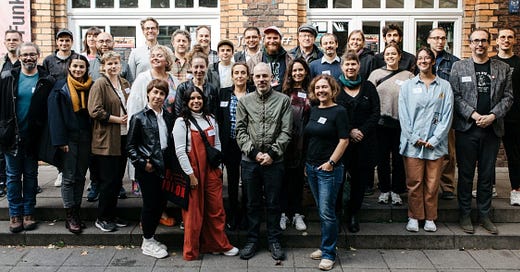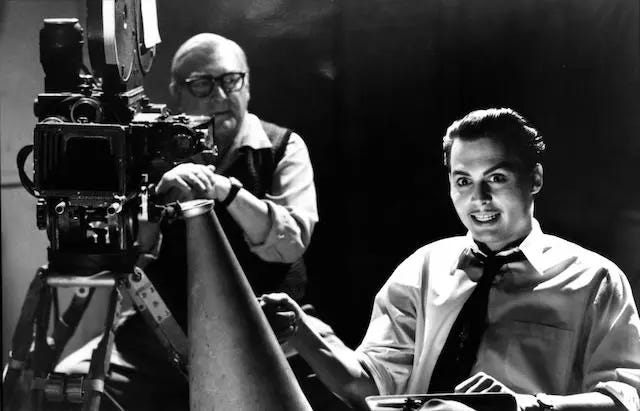The Role and Value of the Film Editor in the Production Process
This years IFEF in Cologne has chosen the subject of The Role and Value of the Film Editor in the Production Process.
The International Film Editors Forum (IFEF) is set to return for its seventh edition today, October 12th, 2024, in Cologne. After two years of virtual-only events due to the pandemic, this in-person networking event provides a platform for film editors from around the globe to engage in meaningful discussions and exchange ideas.
Having attended the event for the past two years, I am unfortunately unable to attend this year. However, after participating in last year's panel on the future of AI and editing, I proposed to Dietmar Kraus that this year's central theme focus on The Role and Value of the Film Editor in the Production Process, exploring the evolving status, compensation, and future of film editing within the industry.
One of the reasons I started this newsletter at the beginning of the year was the aftermath of the streaming bubble bursting. For the first time in about a decade, work hasn't been as readily available. I found myself reevaluating my skill set and reconsidering my value—not just as an assistant editor or editor, but also as a freelancer, artist, storyteller, and member of an ever-evolving industry. The pace of change in the wider industry, coupled with the looming revolution in technology, particularly AI, made this reflection feel urgent.
The Elephant in the Room and an Uncomfortable Truth
The truth is that after a number of years of prosperity driven by the streaming boom, the bubble has now popped. A competitive era in which massive streaming platforms vied with traditional television networks—often with both sides incurring losses in their bid to capture the public's attention—has come to an end. According to a recent BECTU survey, up to 50% of freelance editors and assistants in the UK are currently out of work. Around 81% of freelancers report worsening financial situations, and 70-75% are struggling with mental health issues. A significant 38% are contemplating leaving the industry within five years, a trend that's intensified throughout 2024.
This reveals a larger truth about our profession: we work in an industry where many are overworked and undervalued, but also where there are far too many people chasing too few jobs. While some of us manage to make a decent living when work is consistent, the moment there's a break in employment, the reality of our precarious situation becomes all too clear. Without year-round opportunities, many are left struggling to stay afloat.
Amid all this, I kept returning to one key concept: value. How can I provide better value to the productions I work on, and how can I be valued more for the work I do?
The Idea of Value for an Editor
When I talk about value, I’m referring to the shared understanding between the creative and financial sides of production. It’s about recognising why a producer might choose to hire us for 8 weeks instead of 10, or whether to hire an assistant editor at all. Our goal is to communicate the business case for these changes in a way that highlights how this benefit the overall production. By demonstrating the long-term benefits—whether it’s enhanced storytelling, smoother post-production, or improved overall efficiency—we can make a compelling argument for why investing in those extra resources ultimately benefits the production as a whole.
This issue also ties into the fear of being replaced and the lack of trust or understanding we often face from producers. Editors tend to focus on art and storytelling, but we don't always know the costs involved or why certain budget decisions are made. By understanding these decisions better, we might be able to offer greater value to the production as a whole.
We often shy away from acknowledging that the films and tv shows we work on are business ventures as much as they are works of art. Producer decisions—whether it’s where to shoot, where to do post-production, or what they can afford—are often as much about tax breaks or budgetary concerns as they are about artistic choice. For example, I recently worked on a film that was written and based in America, shot in Canada, directed by an Iranian, edited in Denmark, with VFX, grading, and sound done in Ireland and Europe—where I, an Irish London-based VFX editor, worked out of Dublin and London.
I’ve met a few people who understand their value well and use it creatively. One Oscar-winning editor, for example, structures his contracts so that he doesn’t charge much for feature films, but gets bonuses for each film festival the movie enters. He earns a set amount if the film gets into Cannes, and additional sums for BAFTA and Oscar nominations. This allows him to take on projects with great potential but limited budgets, knowing that if the film succeeds, wins awards and is critically and financially successful, he will ultimately be compensated. He takes a risk in them but they must reward him if that risk proves to be successful.
Of course, not all of us have the option of negotiating deals like that, but it’s a great example of someone who knows their value and aligns it with both artistic and business considerations.
The Value of the Assistant and the Importance of a Team
I understand that the cost of a dedicated assistant editor throughout post-production can be prohibitive for many. And many editors don’t see the need of leading a team as their responsibility, especially when they themselves struggle to communicate their own value. But I’ve seen productions where a strong assistant is central to the project’s success—and others where the assistant is underutilised, to the detriment of the project. Editors run the risk of diminishing their value and not even being considered a head of department (as there is no department to be a head of). I honestly feel that all discussion about the future role of editors must also include the value of assistants and the team that supports the editor.
The Data Revolution (and Lessons from the Analog to Digital Transition)
Back in the analog days, when the vast majority of features were shot on film, there was a role on set called Video Assist or VTR Operator. It was a small role that involved recording an output of the film camera while the camera was rolling so that the director or editor could review what was shot before the developed film came back from the lab (a process which often took a number of days).
As digital filmmaking emerged, the role expanded to include offloading files and creating digital backups. It evolved into the current position of the Digital Imaging Technician (DIT), whose responsibilities now include managing camera files and complex colour grading. While traditional film labs have declined, a huge digital lab industry has risen in their place, and the once-modest Video Assist job has grown into a highly valuable role.
We’re now at the cusp of another significant transition with the rise of generative AI. There’s much debate about its potential dangers and ethical implications, but one thing is clear: the custodians of this data will hold immense value in the future.
The Guardians of the Data
On a film set, there are a few primary sources of data: the story (in the form of the script), metadata from cameras and sound, and the pixels and audio that make up the final product. But all of these elements converge only in the edit. Before the edit there is only the script, and afterwards there is only the information of a locked cut in either picture or audio. This unique position makes the editorial department incredibly valuable, particularly if we can find ways—ethically—to harness and manage this data to benefit the production.
In the past few months of working on this newsletter, I’ve learned that many small improvements and efficiencies can be achieved through better automation. Everything I’ve tested so far points to making people’s lives easier and streamlining production, provided there’s a willingness to implement these changes. However, good automation isn’t a substitute for quality editors or assistants; it simply magnifies the strengths and weaknesses of the person operating it.
Looking ahead, I believe there is potential for fascinating interactions if AI gains access to siloed* datasets from your film or TV show. With careful utilisation, AI could uncover insights across various areas. The most exciting applications will likely emerge in ways we never anticipated.
It’s important to note that much of this is speculative, so anything is possible. Ignoring this technological wave won’t stop its advance. If we turn a blind eye, we risk letting others exploit it. Like in the film There Will Be Blood, we may wake up to find that Daniel Plainview has already “drunk our milkshake.” Instead, we must become the custodians, leading the ethical management and use of this data. This responsibility shouldn’t rest solely on editors; we need a dedicated and full department, which is where the importance of quality assistants and a carefully managed team come into this.
Just as video assist roles evolved to include on-set colour managers and digital overnight labs with multiple supporting roles, the editing department would expand to accommodate a new world of data guardianship.
*Running a siloed generative AI model on your own data means the AI is deployed in a controlled environment where the model doesn't learn or retain any information beyond the session, ensuring data privacy. This setup is efficient because the AI only processes the specific, organised data you provide, making it highly focused and relevant to the task at hand. Since the data is structured, the model can quickly generate accurate outputs without needing broad generalisation, reducing the computational overhead and time typically associated with training on large, unstructured datasets.












